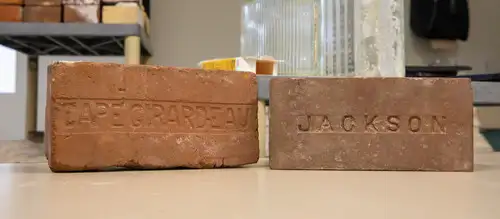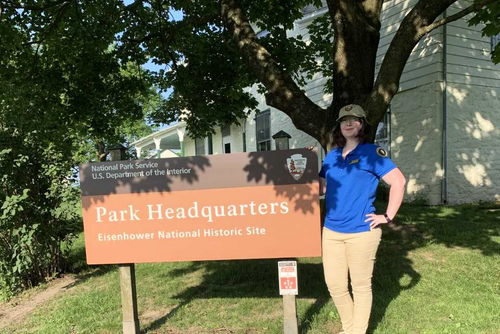Historic Preservation
Continue to main content
Historic Preservation Degree Jobs & Outcomes
-
$67k
Archivist
According to the Bureau of Labor Statistics, the mean annual salary for archivist is $67,620.
-
$70k
Curator
According to the Bureau of Labor Statistics, the mean annual salary for a curator is $70,060.
-
$78k
Historian
According to the Bureau of Labor Statistics, the mean annual salary for a historian is $78,470.
In your historic preservation degree, learn to analyze and document the built environment through course work and unique hands-on learning opportunities. Complete a minimum of 120 credit hours to complete this degree, including the general education requirements and at least 39 senior division hours.
69-72 Hour Major – No minor required
- GH315 Historiography (3)
- HP100 Introduction to Historic Preservation (3)
- HP200 Introduction to Techniques of Local History (3)
- HP450 Problems in Historic Preservation (3)
- HP498 Professional Portfolio Review (3)
- HP585 History of American Architecture (3)
- HP588 Legal and Economic Principles of Historic Preservation (3)
- US105 American History I (3)
- US107 American History II (3)
Public History Breadth Requirement:
Choose 6 hours from:
- HP405 Archives and Special Collections Studies (3)
- HP410 Museum Studies (3)
- HP420 Historic Site Administration (3)
History Breadth Requirement:
9 hours of EH, GH, US, WH 200-500 level or approved departmental UI courses, of which 3
hours MUST be 400-500 level.
HP Electives: Choose 9 hours
- HP525 Living History in Historic Sites (3)
- HP540 Topics in Historic Preservation (3)
- HP552 Historic Preservation Field School (3)
- HP575 Collections Management (3)
- HP580 History of American Building Materials and Techniques (3)
- HP589 Historic Preservation-Based Economic Revitalization (3)
course
Internship: 9 hours
- HP500 Historic Preservation Internship I (3)
- HP501 Historic Preservation Internship II (6)
- HP502 Historic Preservation Internship III (9)
Choose 6 Hours:
- AG440 Precision Agriculture (3)
- AN181 Introduction to Cultural Anthropology (3)
- AN182 Introduction to Archaeology (3)
- AN382 Archaeology: Method and Theory (3)
- AR284 Photography Fundamentals (3)
- CM126 Computer Assisted Drafting (3)
- DS104 Exploring Interior Design (3)
- DS220 Design Communications (3)
- IU314 GeoInfo Science Today (3)
- MG301 Principles of Management (3)
- MK301 Principles of Marketing (3)
- TH101 Acting for Non-Majors (3)
- UI351 Public Opinion (3)
Choose 3 Hours From:
- AH511 American Art (3)
- AN399 Indigenous Peoples of North America (3)
- DS206 History of Interiors II (3)
- OS306 Perspectives of Urban Design (3)
- TH351 Costume Design I (3)
- TH395 Period and Style (3)
- UI337 Issues in Modern Architecture (3)
- UI340 Housing Perspectives (3)
- UI341 Victorian Studies (3)
- UI401 American Cultural Landscapes (3)
- US360 Women in American History (3)
- US420 African Americans During Slavery (3)
- US446 Civil Rights Movement (3)
- US508 African Americans During Segregation and Jim Crowe (3)
- US524 American Rural History (3)
- US525 American Urban History (3)
- US530 African American Experience (3)
Additional Requirement – 3 hours in the history of the designed environment*:
- AN182 Introduction to Archaeology (3)
- AN382 Archaeology: Method and Theory (3)
- DS206 History of Interiors II (3)
- GG180 Cultural Geography (3)
- HP552 Historic Preservation Field School (3)
- HP580 History of American Building Materials and Techniques (3)
- HP589 Historic Preservation Based Economic Revitalization (3)
- OS120 Introduction to Urban Studies (3)
- OS306 Perspectives of Urban Design (3)
- UI337 Issues in Modern Architecture (3)
- UI340 Housing Perspectives (3)
- UI401 American Cultural Landscapes (3)
Some requirements may be fulfilled by coursework in major program.
- Social and Behavioral Sciences – 6 hours
- Constitution Requirement – 3 hours
- Written Communication – 6 hours
- Oral Communication – 3 hours
- Natural Sciences – 7 hours (from two disciplines, one to include a lab)
- Mathematics – 3 hours
- Humanities & Fine Arts – 9 hours (from at least two disciplines)
- Additional requirements – 5 hours (to include UI100 for native students)
- Civics examination
First Year
Fall Semester (13 Hours)
- UI100 (1)
- EN100 (3)
- HP100 (3)
- US105 (3)
- General Education (3)
Spring Semester (15 Hours)
- HP200 (3)
- US107 (3)
- General Education (3)
- General Education (3)
- General Education (3)
Second Year
Fall Semester (15 Hours)
- Group A Interdiscip Skills (3)
- General Education (3)
- General Education (3)
- General Education (3)
- General Education (3)
Spring Semester (15 Hours)
- GH315 (3)
- Group A Interdiscip Skills (3)
- General Education (3)
- General Education (3)
- General Education (3)
Third Year
Fall Semester (14 Hours)
- EH/GH/US/WH200-599 (3)
- HP410 or HP420 (3)
- HP Elective (3)
- Elective (3)
- Elective (2)
Spring Semester (15 Hours)
- HP405 or elective (3)
- HP450 (3)
- HP Elective (3)
- Group B Cultural Perspective (3)
- Elective (3)
Summer Internship (9 Hours)
- HP500/501/502 (9)
Fourth Year
Fall Semester (12 Hours)
- EH/GH/US/WH200-599 (3)
- HP410/HP420 or Elective (3)
- HP585 (3)
- Elective (3)
Spring Semester (12 Hours)
- EH/GH/US/WH200-599 (3)
- HP498 (3)
- HP588 (3)
- HP Elective (3)
NOTE: summer field school is an option; meets HP Elective requirement.
Degree requirements for all students: a minimum of 120 credit hours, completion of the General Education program, and completion of 39 senior division hours (300-599). Refer to the Undergraduate Bulletin or Degree Works for additional graduation requirements for your program.
A minimum 2.0 GPA in the major and overall are required to graduate with a BS degree.
What will it cost?
Become a Redhawk.
Do more than dream about the future. Take the first steps to make it all happen.
Accelerated Master’s Degree
Southeast offers an accelerated master’s degree for current students. You can get both undergraduate and graduate credit for some 500 level courses, meaning you can graduate with a master's degree sooner.
Alumna
"The program is very hands-on and you really learn practical skills as opposed to just sitting and listening to lecture after lecture. The professors are passionate about what they teach, and you leave the classroom genuinely feeling like you learned something that you will carry forward with you in life."
Kelsey Barnett

Getting the Job
Your education is just one piece to launching an extraordinary career. Once you’ve mastered the material, you still have to find the job you want, make the right connections, and sell your knowledge and experience—if all this is giving you anxiety, don’t panic. SEMO’s Career Services office is here to help you with the next step. Our boldly supportive faculty will provide the expertise and support you need, so you’re landing your dream job in no time.
The Historic Preservation Alumni Chapter
The Historic Preservation Alumni Chapter connects Southeast Missouri State University Alumni and present students who share a passion for protecting our architectural heritage. This group keeps our SEMO alumni connected, supports current students, and helps preserve our shared history.
Cape Girardeau, Missouri 63701
